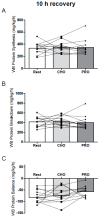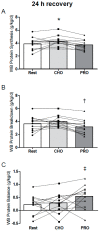Whey Protein Supplementation Enhances Whole Body Protein Metabolism and Performance Recovery after Resistance Exercise: A Double-Blind Crossover Study
- PMID: 28696380
- PMCID: PMC5537849
- DOI: 10.3390/nu9070735
Whey Protein Supplementation Enhances Whole Body Protein Metabolism and Performance Recovery after Resistance Exercise: A Double-Blind Crossover Study
Abstract
No study has concurrently measured changes in free-living whole body protein metabolism and exercise performance during recovery from an acute bout of resistance exercise. We aimed to determine if whey protein ingestion enhances whole body net protein balance and recovery of exercise performance during overnight (10 h) and 24 h recovery after whole body resistance exercise in trained men. In a double-blind crossover design, 12 trained men (76 ± 8 kg, 24 ± 4 years old, 14% ± 5% body fat; means ± standard deviation (SD)) performed resistance exercise in the evening prior to consuming either 25 g of whey protein (PRO; MuscleTech 100% Whey) or an energy-matched placebo (CHO) immediately post-exercise (0 h), and again the following morning (~10 h of recovery). A third randomized trial, completed by the same participants, involving no exercise and no supplement served as a rested control trial (Rest). Participants ingested [15N]glycine to determine whole body protein kinetics and net protein balance over 10 and 24 h of recovery. Performance was assessed pre-exercise and at 0, 10, and 24 h of recovery using a battery of tests. Net protein balance tended to improve in PRO (P = 0.064; effect size (ES) = 0.61, PRO vs. CHO) during overnight recovery. Over 24 h, net balance was enhanced in PRO (P = 0.036) but not in CHO (P = 0.84; ES = 0.69, PRO vs. CHO), which was mediated primarily by a reduction in protein breakdown (PRO < CHO; P < 0.01. Exercise decreased repetitions to failure (REP), maximal strength (MVC), peak and mean power, and countermovement jump performance (CMJ) at 0 h (all P < 0.05 vs. Pre). At 10 h, there were small-to-moderate effects for enhanced recovery of the MVC (ES = 0.56), mean power (ES = 0.49), and CMJ variables (ES: 0.27-0.49) in PRO. At 24 h, protein supplementation improved MVC (ES = 0.76), REP (ES = 0.44), and peak power (ES = 0.55). In conclusion, whey protein supplementation enhances whole body anabolism, and may improve acute recovery of exercise performance after a strenuous bout of resistance exercise.
Keywords: dietary protein; ergogenic aid; net protein balance; power; strength.
Conflict of interest statement
The authors declare that they have no competing interests.
Figures



References
-
- Tang J.E., Moore D.R., Kujbida G.W., Tarnopolsky M.A., Phillips S.M. Ingestion of whey hydrolysate, casein, or soy protein isolate: Effects on mixed muscle protein synthesis at rest and following resistance exercise in young men. J. Appl. Physiol. 2009;107:987–992. doi: 10.1152/japplphysiol.00076.2009. - DOI - PubMed
-
- West D.W., Burd N.A., Coffey V.G., Baker S.K., Burke L.M., Hawley J.A., Moore D.R., Stellingwerff T., Phillips S.M. Rapid aminoacidemia enhances myofibrillar protein synthesis and anabolic intramuscular signaling responses after resistance exercise. Am. J. Clin. Nutr. 2011;94:795–803. doi: 10.3945/ajcn.111.013722. - DOI - PubMed
Publication types
MeSH terms
Substances
LinkOut - more resources
Full Text Sources
Other Literature Sources
Medical
Molecular Biology Databases

